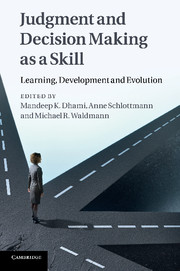Book contents
- Frontmatter
- Contents
- Figures
- Contributors
- Preface
- Acknowledgments
- Chapter cross-reference table
- Part I Evolutionary and neural bases of JDM
- Part II Developmental approaches to JDM
- Part III Learning JDM
- 6 Learning of judgment and decision-making strategies
- 7 Causal models in judgment and decision making
- 8 Learning judgment and decision making from feedback
- Part IV Improving and aiding JDM
- Conclusion
- Index
- References
8 - Learning judgment and decision making from feedback
Published online by Cambridge University Press: 05 December 2011
- Frontmatter
- Contents
- Figures
- Contributors
- Preface
- Acknowledgments
- Chapter cross-reference table
- Part I Evolutionary and neural bases of JDM
- Part II Developmental approaches to JDM
- Part III Learning JDM
- 6 Learning of judgment and decision-making strategies
- 7 Causal models in judgment and decision making
- 8 Learning judgment and decision making from feedback
- Part IV Improving and aiding JDM
- Conclusion
- Index
- References
Summary
Introduction
In this chapter, I first discuss mechanisms of skill learning. Then I focus on the role of feedback. I discuss this in the context of various types of judgment and decision-making tasks. Provision of outcome feedback facilitates learning in relatively simple tasks, but it appears to have no effect or to impair performance in more complex tasks. However, in these latter cases, it is important to distinguish its detrimental effects on performance during learning and possible beneficial effects it has on learning itself (as measured by later performance after feedback has been removed). Processing feedback from previous judgments and decisions may compete with the processing needed to make current judgments and decisions for available cognitive resources. Thus, people may have to decide how to share these resources between using feedback to develop new knowledge (exploration) and using their extant knowledge to formulate the judgments and decisions currently required of them (exploitation).
Mechanisms of skill learning
This book is about instances of judgment and decision making that can be regarded as skills. In the past, the domain over which the term ‘‘skill’’ can be applied was a matter of some dispute. Eventually, Bartlett’s (1948) view that it should be used to cover both mental and motor activities came to be accepted over Pear’s (1948) argument that it should be reserved for “muscular performances.” Nowadays, a physician making a clinical decision is regarded as exercising a skill just as much as a cricket player. This approach implies that skills have common properties that are shared across the different domains in which they are studied. We should expect that what we have learnt from studying motor skills generally holds true for cognitive skills. Thus, in what follows, I will not limit my discussion to research into the cognitive skills underlying judgment and decision making but, where appropriate, I shall also draw on research into motor skills.
- Type
- Chapter
- Information
- Judgment and Decision Making as a SkillLearning, Development and Evolution, pp. 199 - 226Publisher: Cambridge University PressPrint publication year: 2011
References
- 4
- Cited by



